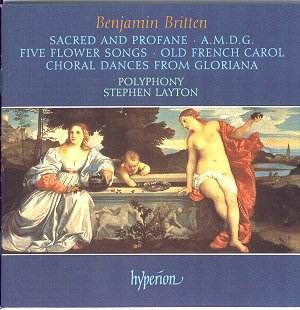Benjamin BRITTEN
Sacred and Profane, A.M.D.G., Five Flower Songs, A Hymn to the Virgin,
Choral Dances from 'Gloriana', Chorale after an Old French
Carol
 Polyphony/Stephen Layton
Polyphony/Stephen Layton
 HYPERION CDA 67140
[61:26]
HYPERION CDA 67140
[61:26]
Crotchet
AmazonUK AmazonUS

Stephen Layton continues his series of recordings for Hyperion with this
fine disc of unaccompanied choral music by Benjamin Britten. Previous composers
featured have included John Rutter, Peter Cornelius, Arvo Pärt and Percy
Grainger, so the arrival of this disc puts Layton and his choir of professional
singers much more into the searchlight of competing versions.
In general they come through with flying colours. Britten's last work for
unaccompanied chorus, Sacred and Profane (1975) receives a superb
performance ahead of such rivals as The Sixteen under Harry Christophers
(ex Collins Classics) and the Choir of Trinity College Cambridge under Richard
Marlow (Conifer Classics). In the final setting 'A Death' Polyphony
takes about thirty seconds off the timing of the other choirs (a significant
amount in a piece that usually lasts a mere three minutes) and this heightened
tempo increases the feeling of a helpless and remorseless charge towards
death, a fate that Britten knew, for him, was not too far off. The final
line (translated into modern English) is 'For the whole world I don't care
one jot' and Peter Evans' description of Britten's setting displaying 'macabre
nonchalance' is particularly well achieved in this performance. In Yif
Ic of Luve Can Layton gives the seductive high soprano line to a solo
singer which works extraordinarily well.
Another first is an additional antiphonal effect introduced into A Hymn
to the Virgin. The young Britten set the Latin and English phrases in
a kind of Concerto Grosso style, with the full choir and a small group of
soloists alternating between them. Layton goes one stage further by placing
his solo group well away from the microphones, increasing further the 'statement
and comment' aspect of the work. This is highly effective.
If there are aspects worthy of criticism, they remain small ones. The printed
text of O Deus, ego amo Te from A.M.D.G. mistakenly includes
the word 'shining' which should read 'sinning'. Of slightly greater concern
is a nagging feeling that the choir's rather 'white' tonal make-up is just
too perfect for much of this music. Layton appears to have kept singers with
colourful voices away from his choir in an attempt to give the greatest possible
cohesiveness. Comparing Five Flower Songs to the version by The Sixteen
or A.M.D.G. to the premiere recording by Terry Edwards and the London
Sinfonietta Chorus (Virgin) one is struck by the musical advantages brought
to the settings by sopranos and tenors (in particular) who are able to use
a wider dynamic and a much stronger use of vocal colour.
Nevertheless, Polyphony is a crack choir who sing with immaculate intonation
and a sure sense of internal balance. The Chorale after an Old French
Carol is suitably drenched in securely sung harmonies and I have not
heard the Choral Dances from "Gloriana" better done. The Temple
Church acoustic is ideal. At 61:26 I was left wishing there could be more.
But this is intended to be taken as a statement of approval rather than any
kind of admonition.
Simon Foster

